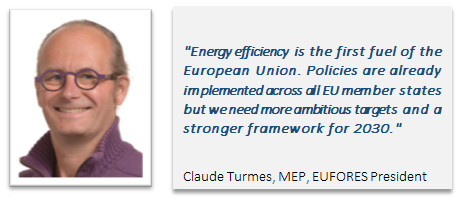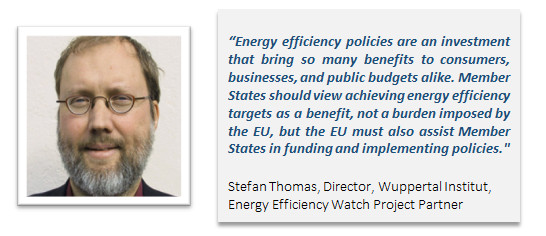
Key research highlights considerable progress in energy efficiency policies but more effort is needed to achieve the 2020 target
Date
Sections
While the Industry, Research and Energy Committee of the European Parliament is set to vote on the latest implementation report on the Energy Efficiency Directive on the 24th of May, exhaustive research – published in the framework of the Energy-Efficiency Watch III project- highlights that the Energy Efficiency Directive triggered good developments in some countries and in some fields of energy efficiency policy, such as energy efficiency obligations and building renovation. However, in overall terms, policy progress is still much too slow or even nearly absent in several Member States.

Implementation of Energy Efficiency policies in the EU
The Energy Efficiency Directive (EED) set up a legal framework, to help the EU and its Member States to achieve the 20% energy efficiency target by 2020. Findings from the Energy Efficiency Watch project shows that, since 2011, there are more new or improved energy efficiency policies than weakened or abandoned. This indicates a clear positive impact of EU policies, especially the Energy Efficiency Directive and the Energy Performance of Buildings Directive. However, it is unclear whether this improvement in policy implementation will be enough to achieve the energy efficiency or savings targets of Art. 7 and Art. 3 of the Energy Efficiency Directive. Many EU Member States still need to grasp the benefits or be given the resources to invest enough money and implementing capacity in energy efficiency policies. This would not only make the EU number 1 in energy efficiency but also lead the way out of the economic and financial crisis.
Furthermore, the data shows enormous disparity among Member States in levels of ambition and progress of energy efficiency policies. According to experts, Denmark, Finland and Estonia are the three countries where energy efficiency policies progressed most since the second NEEAPs while Spain, UK and Hungary are the three countries where the least progress was made. Besides, significantly increased progress was reported for Cyprus, Italy, Slovakia and the Czech Republic.

These ups-and-downs in energy efficiency policy will continue as long as the multiple benefits of energy efficiency are not sufficiently understood by national policy makers and stakeholders and have not become an integral part of security and economic policy.

Europe becoming ‘number one on energy efficiency’ is connected to many concrete chances such as job effects, increased competitiveness, stimulating innovation. Today, energy efficiency is a key element on the EU's political agenda. The Energy Efficiency Watch 3 project delivers practical evidence on where the implementation of energy efficiency policies stands, what is working well, what less - and why this is the case. It shows that policy makers are progressively recognising energy efficiency as a suitable means to address the triple challenge of economic recovery, energy dependency and climate change. However, policies are only regarded as supportive in this respect if effective and stable. Therefore, public acceptance depends on the quality and effectiveness of energy efficiency policies.
Key Policy Conclusions from the Energy-Efficiency-Watch-Project
In line with project findings, the EEW consortium provides both general recommendations applying to all directives and detailed recommendations per directive to increase the acceptance and support for energy efficiency policies:
1. Develop positive European and national narratives on energy efficiency: So far, EU directives have not been able to create a common understanding of the multiple benefits of energy efficiency for all EU Member States and the variety of their citizens, companies, and public authorities. Experience from various Member States shows that the added value of energy efficiency needs to be explained and communicated by national governments in order to implement successful policies and create broad acceptance and subsequent political majorities in favour of energy efficiency.
2. Foster innovative business models: There is a need to put more focus to the translation of complex methodologies and terminologies into easily applicable and reliable, continuous implementation programmes. This should go in line with a joint and coherent analysis of potentials, technology roadmaps, transformation pathways and end-points, and scenarios between Member States and the different EU directives.
3. Introduce binding and specific targets together with effective financial instruments: To define and measure the aimed effect of any policy, it is essential to have binding and specific targets in place. Therefore, policy measures mentioned in the NEEAPs should always be connected to a specific target, as a breakdown of a specific and binding national and EU targets for final and primary energy consumption.
Following these recommendations can help generating positive European and national narratives on energy efficiency and provides the chance to achieve climate targets, a strengthened economy, and energy security all at the same time.
Background information on the project
The Energy-Efficiency-Watch project, which is co-founded by the Intelligent Energy Europe Programme, facilitates and supports since 2006 the implementation of EU energy efficiency policies in the Member States. The consortium analyses the National Energy Efficiency Action Plans (NEEAPs) and the development of European and national Energy efficiency policies. It carried out expert consultations and a EU-wide survey to gather competent opinions on the progress of energy efficiency policies in the Member States.
Its publications include: 28 Country Reports (available in English and national languages) which analyse the progress of energy efficiency in each Member State; 10 Case Studies that present outstanding energy efficiency policies in Europe and offer inspiration to policy makers; the Key Policy Conclusions, which condense the project’s and translate them into strategic policy conclusions; the project brochure: “How to make Europe Number 1 in Energy Efficiency” and the Expert Survey Report which gathered input from over 1100 experts, reporting on levels of ambition and progress of efficiency policies in each Member State.
All documents are now online and can be found here: www.energy-efficiency-watch.org

Disclaimer: The sole responsibility for the content of this press release and the related publications lies with the authors. It does not necessarily reflect the opinion of the European Union. Neither the EASME nor the European Commission are responsible for any use that may be made of the information contained therein.
